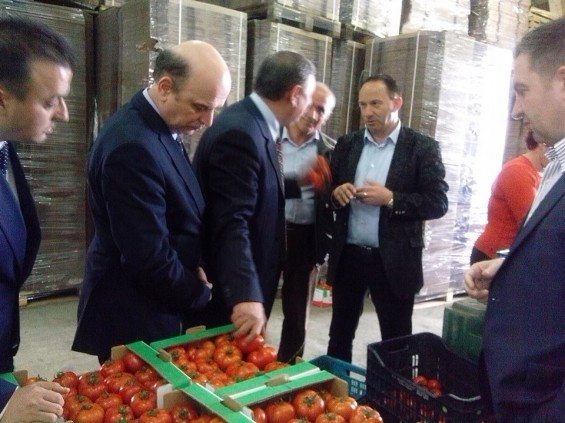A special package with 40 facilitating measures for farmers, has been prepared by the ministry of Agriculture, Rural Development and Administration of Waters in Albania, in an effort to boost domestic production.
The new package contains a significant reduction of the tax burden. Farmers will be less tax on saplings, inputs and their agricultural activity, mainly the production sector.
The package offers privileged treatment to businesses that export agricultural produces by customs, tax authorities and state agencies of the Ministry of Agriculture.
This package also aims important reforms which relate to the quality of the safety of food, veterinary service, free movement of goods, etc.
Minister Edmond Panariti says that the package will help Albanian agriculture to embrace the most advanced standards of the European Union.
Growth must be preserved
Agricultural growth in Albania is seeing a growth during 2014. The volume of exports has seen a growth, especially in several priority sectors, such as the production of vegetables and fruits. Exports for the first three months of the year are over 50% higher than the same period last year.
Experts say that in order for this positive trend to be sustainable and growing, it needs to be supported by a package of facilitating measures by the state.
It is estimated that the introduction of this package of measures will result in 10 million Euro worth of benefits.
Panariti says that these measures will lead to a significant impact of the agricultural and farming production. “This way, Albania adopts a number of complex reforms, as part of this package for agriculture, which bring our system closer to the European system of agriculture and these are certainly in line with the Policies of the Joint European Market in the domain of agriculture”, says Panariti.
The minister says that the state considers organic production as important and aims to encourage farmers to focus on this production. “What farmers must fanatically protect is organic production. Let us not use hormonal stimulants, but use 100% organic fertilizers, as this will offer an incomparable quality to those which grow through chemical fertilizers and insecticides.
Simplifications in bureaucratic procedures
Alban Zusi, deputy minister of Agriculture explains the details of the facilities that businesses in the agricultural sector will benefit. He says that farmers will not only benefit reduction of taxes, but they will also undergo fewer state bureaucracies.
“These measures aim to facilitate the activity of farmers, agriprocessors and all operators. Let us facilitate their administrative burden, reduce the time that they need to benefit services, reduce chances for corruption and the cost of corruption for this sector. We aim at lifting from the cost of agricultural production unfair taxes or misinterpreted taxes. Especially the costs of import products and costs of agricultural inputs”.
Package of measures for the sector of agricultural also has tax concessions, starting from the immediate refund of VAT to direct tax stimulants. Zusi talks about the measures included in this draft.
“Farmers will have safe inputs such as seeds and saplings. There will also be a totally reformed veterinary system. We will have a reduction of taxes for raw material, in order to drive businesses toward processing and not import”, says the deputy minister of Agriculture.
Many projects, many promises, very few things have been done in 23 years
All the governments that have led the country in these 23 years, both left and right, have made a lot of promises to farmers, but very little or nothing has been done so far.
It’s difficult to categorize Albanians who live in rural areas as farmers, because only a small part of them have developed properties.
In the suburbs of Tirana, several peasants told IBNA that the majority of farmers in villages are business people from the cities.
Even in those cases when peasants have attempted to invest on agricultural and farming products, the support from the state has been minimal.
The main problem that producers in villages are facing is the failure to sell the product. Many peasants cannot sell their product due to the lack of infrastructure.
As far as profits are concerned, the situation is even worse. Cultivators say that the profit that they make as direct producers of fruits and vegetables is several times lower than that of merchants.
Divjaka is the typical case for this. Every year, this area cultivates 600 acres of melon and it’s the main supplier of the domestic market.
“In this field, I produced melon and we went through a lot to bring it to the merchants. I sold it for 10 lek per kg, while merchants sell it for 40 lek per kg”, says a producer of melon in Divjaka.
News Source: IBNA

Leave a Reply
You must be logged in to post a comment.